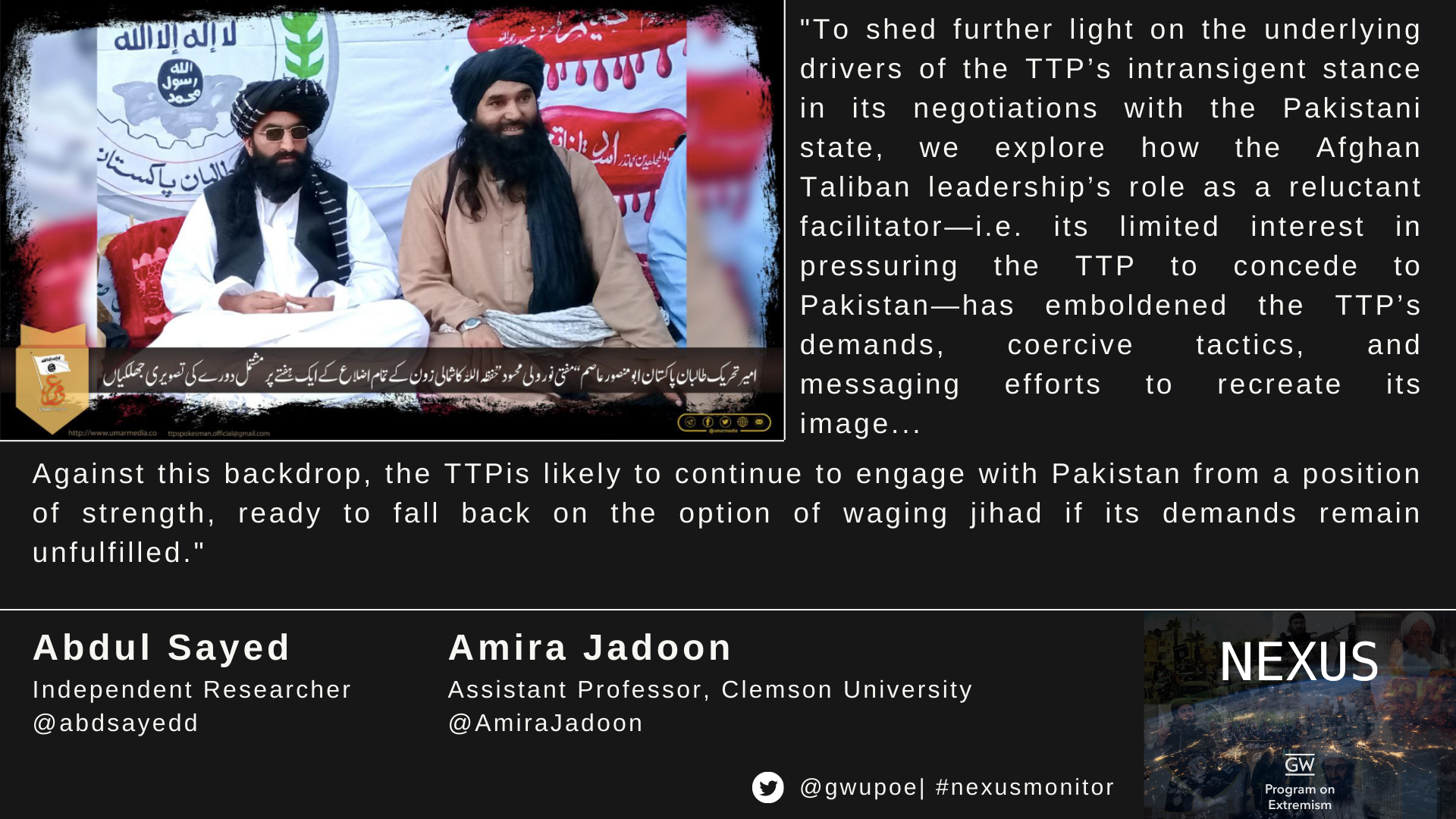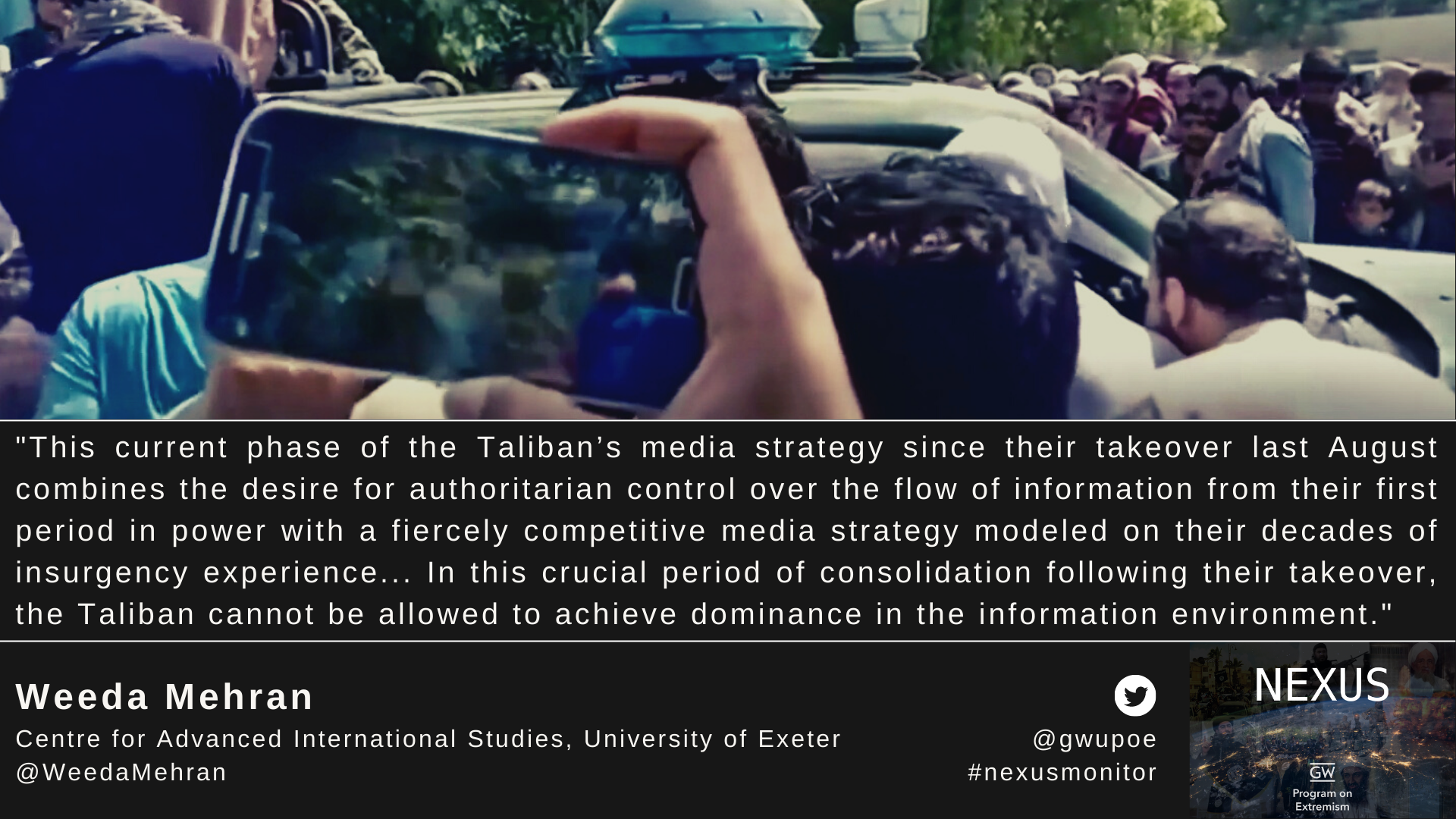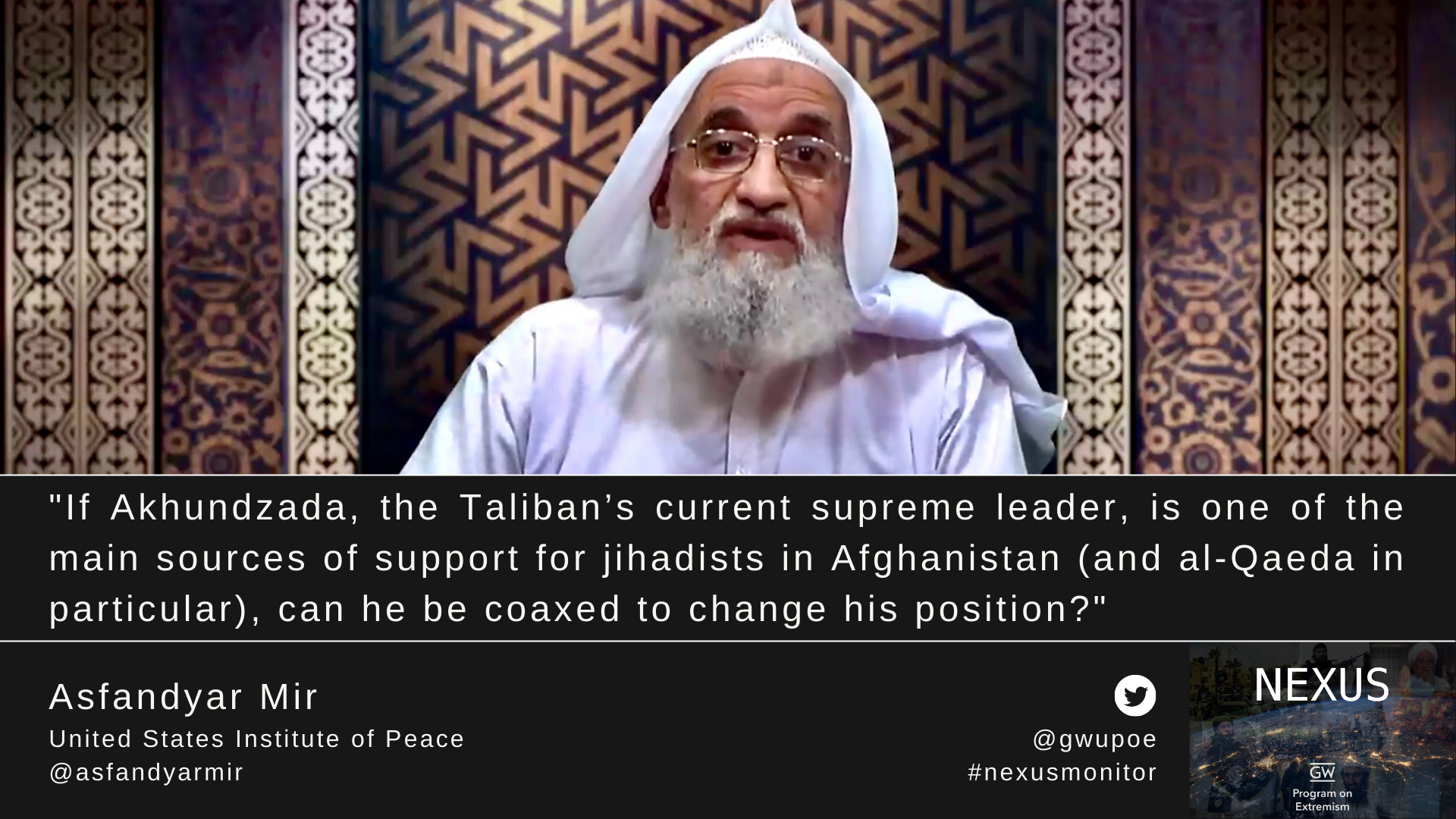PDF Version
UNSURPRISINGLY, RECENT UPDATES about the latest round of negotiations between a “tribal jirga” and members of the proscribed militant organization, the Tehrik-e-Taliban Pakistan (TTP) failed to deliver any significant breakthroughs, or meaningful progress toward a political agreement. Largely enveloped in secrecy, news about the TTP-Pakistan negotiations first emerged in late 2021, when Arif Alvvi, the current President of Pakistan, indicated that the government would consider providing amnesty to TTP members if they agreed to disarm. As talks continued, both parties agreed upon a temporary ceasefire in November 2021, which by mid-2022 led to the announcement of an indefinite ceasefire against the backdrop of continued talks. On August 7, 2022, a TTP senior commander—who also happened to be a key member of its negotiation team, Umar Khalid Khurasani—was killed in an unclaimed attack in Afghanistan. While the killing raised uncertainty about the future of the TTP-Pakistan negotiations, it served as an indicator of underlying complexities and future challenges.
While talks between the two parties—facilitated by the Afghan Taliban—had been ongoing for several months, it was only in June 2022 that the Pakistani military finally made efforts to gain parliamentary approval for continued engagement with the country’s deadliest terrorist organization. Generally speaking, peace negotiations between state actors and militant groups that consider giving up political violence in exchange for political concessions are often fraught with complications, mistrust, and delays, resulting in mixed outcomes. In the case of the Pakistan-TTP negotiations, past failures at similar attempts and the stumbling trajectory of current talks offer few reasons to be optimistic about an outcome that ensures sustainable peace, or results in a settlement that is acceptable to the larger Pakistani society, which has suffered from TTP-perpetrated atrocities for well over a decade. This time, one of the primary reasons underpinning this bleak outlook is the TTP’s unyielding negotiating stance, displayed through its unwillingness to compromise on its demand of reversing the 2018 merger of the Federally Administered Tribal Agencies (FATA) into Khyber Pakhtunkhwa (KPK). This has resulted in a deadlock between Pakistani negotiators and the TTP, which is likely to persist given the Afghan Taliban’s reluctance to become too deeply entangled.
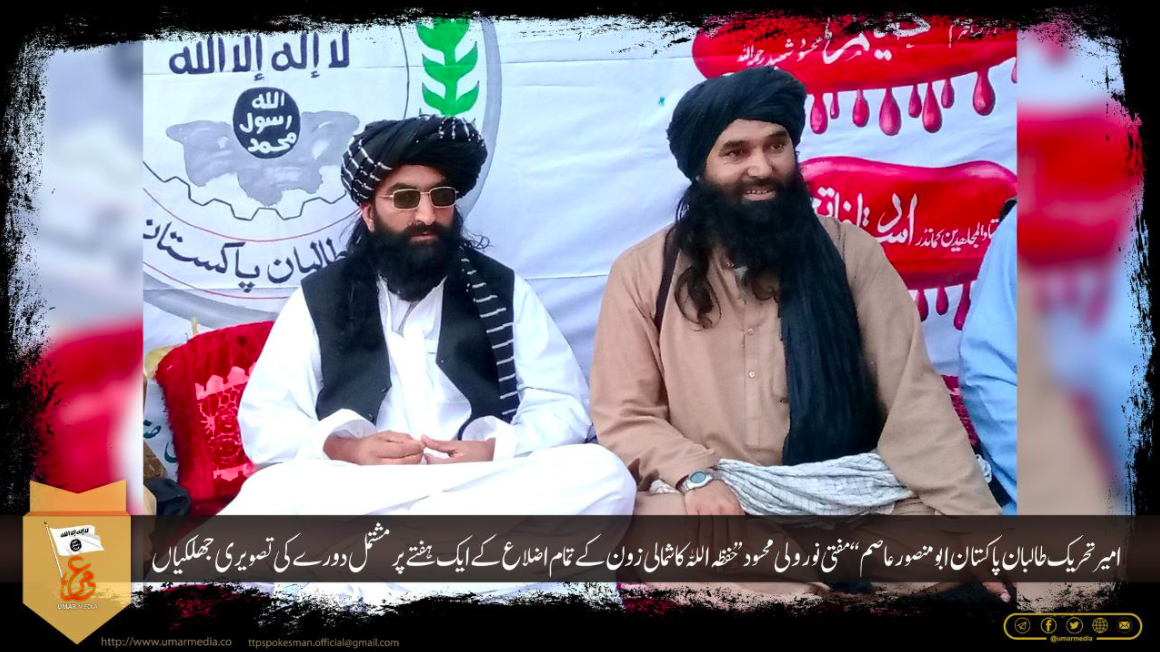
TTP emir Mufti Noor Wali Mehsud (right) and deputy emir Mufti Muzahim (left) as featured in the group’s core media outlet, Umar Media, November 2021.
An examination of the TTP’s historical evolution since its emergence in 2007 clearly shows that the organization was degraded significantly throughout much of the last decade, as indicated by its declining operational activity in Pakistan post 2014-15. Major contributors to the TTP’s decline were internecine conflict, heavy losses from military operations, splintering and defections to Islamic State Khorasan (ISK), and significant reputational costs associated with ruthless civilian targeting. In this context, it is perhaps unexpected that the group resurged post 2018, intensified its attacks on Pakistani security personnel, and successfully repositioned itself to negotiate with the Pakistani state from a position of strength, presenting bold demands of autonomy and constitutional reversals.
What explains the TTP’s current unrelenting political posture? To shed further light on the underlying drivers of the TTP’s intransigent stance in its negotiations with the Pakistani state, we explore how the Afghan Taliban leadership’s role as a reluctant facilitator—i.e. its limited interest in pressuring the TTP to concede to Pakistan—has emboldened the TTP’s demands, coercive tactics, and messaging efforts to recreate its image. Additionally, we discuss how both the optics of Pakistan’s eagerness to negotiate with a proscribed group while experiencing significant internal socioeconomic and political challenges, as well as prevailing anti-Pakistan sentiment amongst Afghan Taliban militants, have contributed to the TTP’s current emboldened status.
The Afghan Taliban: A Reluctant Facilitator
After years of targeting the TTP’s leadership and militant base, the Pakistani army quietly initiated talks with TTP leaders in Afghanistan in late 2021 in hopes of finding a sustainable peace solution. Despite past failures, the Taliban’s takeover of Kabul created a unique opportunity for Pakistan to finally resolve the resource-draining TTP problem. From Pakistan’s perspective, leverage over their longstanding ally, the Afghan Taliban, could now be shored up to add pressure on the TTP at the negotiating table. However, it soon became apparent that the TTP was also betting on the tacit support of the Afghan Taliban to negotiate its own demands from a strengthened position. For Pakistani officials, this renewed hope of reaching a negotiated settlement was flawed from the beginning, largely because it seemed to be rooted in an inaccurate perception of two inter-related factors: (1) the Afghan Taliban’s loyalty to the Pakistani Army and government, especially post U.S. withdrawal, and (2) the Afghan Taliban’s willingness to crack down on the TTP or pressure the group to soften its demands.
As we discuss below, the Afghan Taliban's role as a reluctant facilitator has played an important role in emboldening the TTP, and appears to be rooted in four key factors: the Afghan Taliban's desire to reduce its dependence on the Pakistani state; varying levels of support for Pakistan amongst Afghan militants along with the prevalence of anti-Pakistan sentiment; the Afghan Taliban's unwavering support for TTP due to their historic role in the former's insurgency over the past two decades; and finally, the Taliban's ongoing need for resources and personnel to keep ISK and other local resistance movements at bay.
Distancing from Pakistan
At present, the TTP’s negotiations with Pakistani representatives seem to have reached an impasse, with no clear roadmap ahead to reach a middle ground. The TTP’s most contentious demands include reinstatement of the semi-autonomous status of FATA, whereas the government has laid out its own conditions for the TTP’s disarmament and organizational dissolution. The Taliban’s takeover in Afghanistan served as both an ideological and operational win for the TTP given its support to the Afghan insurgency, but the Afghan Taliban’s role as a “reluctant facilitator” in TTP-Pakistan talks has further emboldened the TTP to take a firmer position when it comes to relaying its demands. Many factors have likely contributed to the Afghan Taliban’s reluctance to become entangled in the TTP-Pakistan problem, key among them the desire to reduce its reliance on Pakistan. In general, Pakistan’s relationship with the Afghan Taliban has always been fraught with challenges, and contingent upon the existence of enduring, overlapping interests. But the Taliban's takeover and a complete US withdrawal from Afghanistan have undermined this relationship, due to divergent interests in the new era where the Taliban no longer require a safe haven. Most notably, the Afghan Taliban leadership have demonstrated their interest in fostering relationships with neighboring states beyond Pakistan, to include China and India, with the former recently initiating a visa issuance process for Afghan traders in Kabul. These trends, while more pronounced now, are not new. For example, partially motivated by an attempt to minimize Pakistan’s influence, the Taliban improved their relations with Iran under the Taliban’s second supreme leader, Mullah Akhtar Mohammad Mansour.
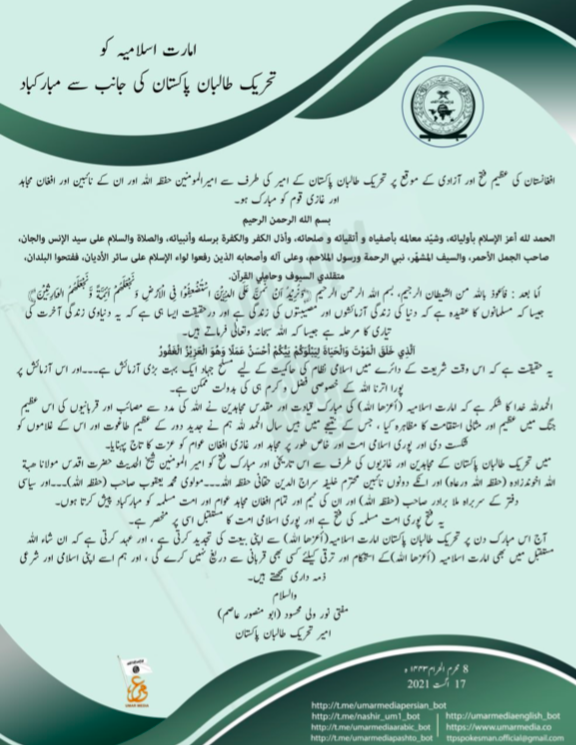
A statement released by Umar Media penned by TTP emir Mufti Noor Wali Mehsud extending congratulations to the Afghan Taliban on their takeover in August 2021, and renewing the TTP’s pledge of allegiance to Taliban supreme leader Hibatullah Akhunzada.
Despite political pressure from the Pakistani government, the Afghan Taliban remain cautious in their dealings with the TTP, which has launched a significant number of cross-border attacks against Pakistani security personnel from Afghan soil. In August 2022, members of the Pakistani parliament raised concerns about rising levels of violence in KPK, associated with the return of militants from Afghanistan.
Robust TTP support and Countering Domestic Challengers
In addition to the Afghan Taliban’s eagerness to reduce their dependence on Pakistan, there are two other reasons driving the Taliban’s more passive attitude on this issue. First, given the historical ties between the two groups and shared histories, the TTP has robust support among loyalists within the various ranks of the Afghan Taliban, who are unlikely to turn on TTP members for Pakistan’s sake. Second, other domestic challenges such as dealing with threats of internal resistance and violence perpetrated by ISK have contributed to the Afghan Taliban’s reluctance. The Taliban continue to be engaged in a fierce rivalry with ISK, which further reduces its incentives to alienate TTP members and leaders. Although the Afghan Taliban claim to have eradicated the ISK threat in the country, much evidence points to the contrary - ISK remains a significant security threat to the Taliban’s governance and legitimacy. Although ISK’s initial ranks were populated by defecting TTP members, over time, several militants defected from the Afghan Taliban as well, helping to convert the group into a formidable military front against the Afghan Taliban. From this perspective, the Afghan Taliban’s reluctance to pressure the TTP makes sense, as any aggressive actions against the group could incentivize additional fighters to join oppositional groups like ISK, and also create deeper fissures within the Taliban.
Varying levels of Support for Pakistan and Anti-Pakistan Currents
Another factor that is often overlooked when it comes to examining the Afghan Taliban’s approach to the TTP-Pakistan problem is the anti-Pakistan sentiment amongst Afghan Taliban foot soldiers. Some of the Afghan Taliban’s rank and file members have shown an interest in continuing the next leg of their jihad against Pakistani security forces after “liberating the homeland from the US-led NATO occupation.” This stands in stark contrast to the carefully crafted public narratives delivered by the Taliban’s more media-savvy senior leadership. Yet, the anti-Pakistan sentiment amongst Taliban foot-soldiers, as noted in their public remarks, provides insights into the Taliban’s reluctance to pressure the TTP, as well as the long-term implications of the Pakistani state’s alignment with U.S. and NATO forces in the global war on terror. Moreover, this hostility towards the Pakistani state echoes the decades-old anti-Pakistan narrative amongst Afghans with respect to the disputed Durand Line— the borderline that has divided the two countries since Pakistan’s establishment in 1947. In 2022, Pakistan has continued its efforts to seal this border, which is likely to compound tensions between the Afghan Taliban and Pakistan, and incentivize continued cross-border attacks from TTP militants.
Expressions of anti-Pakistan sentiments by Afghan Taliban foot soldiers may not merely be rhetorical. There have been reports suggesting that beyond sheltering the TTP in Afghanistan, some Taliban members may covertly be supporting the TTP in their fight against the Pakistani state. For example, the TTP’s first major attack since the Taliban’s takeover was in March 2022 on a Pakistani military camp in the Tank district of KPK, which included three suicide bombers who were Afghan militants.[1] Similarly, another suicide attack that targeted a Pakistani security convoy in North Waziristan in May 2022 was carried out by an Afghan militant. Despite such attacks, TTP rank and file members, along with Taliban fighters, are likely to be generally aware that conditions on the ground in Pakistan may not be conducive to a jihadist victory in ways similar to Afghanistan. Nevertheless, the Taliban’s triumph in Afghanistan has boosted the TTP’s resolve. And while they may not expect a similar victory in Pakistan, the current geopolitical opportunities are certainly conducive to a continued fight with a state engulfed in domestic turmoil. As noted by a senior TTP military commander to author Abdul Sayed, while the TTP has agreed to a ceasefire and negotiations with Pakistan, prevailing conditions provide an opportune time for war. Moreover, varying levels of support for the Pakistani state amongst Afghan Taliban rank and file members, as well as within its leadership, provide an additional barrier to the Afghan Taliban’s involvement in TTP-Pakistan peace talks.
The TTP's Strengthened Negotiating Position
Notably, the TTP does not seem to be overly concerned about a long time horizon with respect to the peace talks, as any delays provide the group with additional time to continue its multi-media messaging campaigns designed to reinvent its image, especially amongst the Pakistani population. The TTP’s concerted effort to renew its tarnished image has been evident for a while, but especially after Noor Wali Mehsud assumed the top leadership position and the Taliban took Kabul. Since then, the TTP has emphasized the religious basis of its fight, announced its intention to steer clear of indiscriminate violence, and publicly disassociated itself from transnational jihadist movements. For example, the TTP condemned ISK and labeled it as a conspiracy of regional intelligence agencies in reaction to a UNSC report that, for the first time in July 2020, warned of possible links between the TTP and ISK.
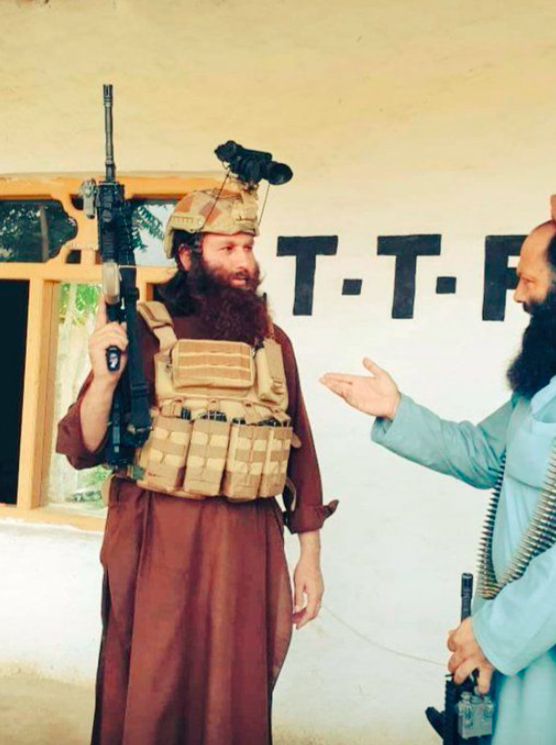
TTP fighters equipped with U.S. and Afghan security forces military gear following the Taliban takeover. Released by Umar Media, 2022.
The TTP’s objective to revamp its image is also evident from its current messaging to the religious, political, and tribal elders delegations sent from Pakistan to negotiate with the group. For example, TTP leaders have sought to nullify the government’s past allegations that the TTP has been supported by Pakistan’s rival intelligence agencies, predominantly India. Additionally, in its public communications, the TTP has emphasized that its willingness to negotiate an end to its fight is tied to the broader interests of the Pakistani nation. The TTP’s messaging, especially since its resurgence after 2018, has not only encompassed its goal of reshaping public opinion, but has also sought to align its grievances with other disaffected Baluch and Pashtun communities, in the hopes of strengthening its negotiating power with the Pakistani state, and ensuring its own long-term relevance.
Another source of the TTP’s strengthened negotiating position is the perceived weakness of its opponent, Pakistan, which has been experiencing high levels of socioeconomic and political instability. Mired in their own set of domestic problems, Pakistani government and military officials come across as beleaguered, desperate for a peace deal to curtail terrorism. This perception is evident from the tones taken by the TTP’s leader, Mufti Noor Wali Mehsud, and spokesperson Muhammad Khurasani in their public statements since last October when these negotiations became public knowledge. For example, the TTP attributes Pakistan’s problems of inflation and taxes, rising ethnic strife, and government mismanagement of natural disasters to the "the [Pakistani] government's cruel policies", the corrupt practices of its civil and military leaders, and a lack of Shari’a implementation.
So far, the TTP’s position in the negotiation process has been strengthened by their displays of resolve. While the TTP’s conditional demand of “no negotiations unless prisoners were released” highlighted the group’s audacity, the Pakistani government’s acquiescence to this demand sent a signal of compromise. As the recently-killed senior TTP commander, Umar Khalid Khurasani, expressed in an interview with author Abdul Sayed in November 2021, in the absence of such confidence-building measures, the group preferred to continue its fight against the Pakistani state. In this context, releasing jailed militants—despite widespread criticism and without any plans of militant disengagement or reintegration—undermines confidence in the negotiating strength of the Pakistani state. In addition, the Pakistani military’s constant stream of overtures to engage TTP leaders in talks has generated the perception amongst the group’s rank and file members that the Pakistani military is operating under a sense of hopelessness, through which it views a peace settlement as the only realistic option to mitigate the TTP threat.[2]
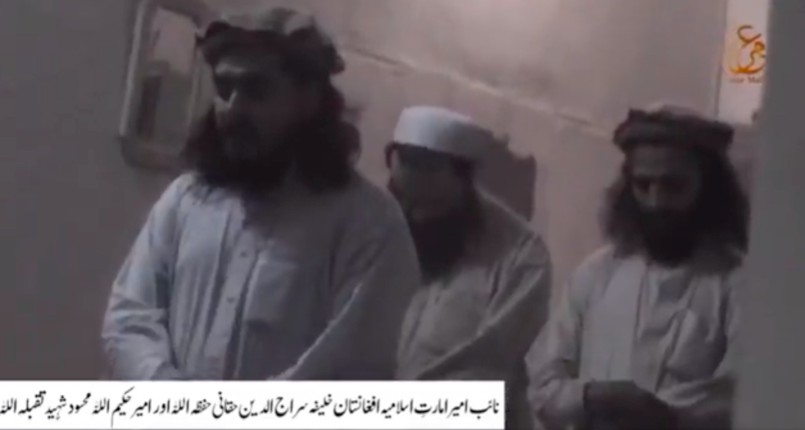
The Afghan Taliban’s deputy supreme leader, as well as current interior minister and chief of the Haqqani Network, Sirajuddin Haqqani, pray behind former TTP emir Hakeemullah Mehsud. Released by Umar Media, June 2022.
According to insider accounts, the TTP only agreed to negotiate with Pakistan following the Afghan Taliban’s recommendation to do so soon after their Kabul takeover.[3] This discussion took place when a top TTP delegation, led by Noor Wali Mehsud, went to Kabul to congratulate the Afghan Taliban on their historic victory against the United States. The meeting was attended by Afghan Taliban heavyweights, including deputy prime minister Mullah Abdul Ghani Baradar, interior minister Sirajuddin Haqqani, defense minister Mullah Muhammad Yaqub, and deputy ministers for interior and defense Sadar Ibrahim and Mullah Fazil Akhund, respectively, among others.[4] The Taliban leaders expressed their deep gratitude to the TTP for its support during the insurgency years, which they acknowledged to be pivotal in their victory over the U.S.-led coalition in Afghanistan.
It was during this meeting that the Afghan Taliban relayed the Pakistani military’s offer to the TTP— to initiate talks and reach a negotiated political settlement. While the TTP were free to respond to Pakistan’s offer as they wished, the Taliban promised to support the TTP to obtain a dignified political settlement. Interestingly, according to sources, the Afghan Taliban’s offer to mediate came as a surprise to the TTP delegation. Although the TTP expressed their distrust of the Pakistani state, the delegation members indicated their willingness to negotiate with Pakistan on the basis of the Taliban’s recommendation, and their promised support.[5]
U.S. Counterterrorism in Afghanistan and Other Considerations
The recent targeted killing of al-Qaeda’s 71-year-old leader, Ayman al-Zawahri, in Kabul is likely to make it more difficult for the Taliban to gain international legitimacy if Afghanistan is still viewed as a safe haven for terrorists under their watch. While the successful targeting of al-Zawahri is promising for U.S. over-the-horizon counterterrorism capabilities, it also reinforces the perception that ties between al-Qaeda and its hosts, the Afghan Taliban, remain strong despite the Taliban’s denial of knowledge of al-Zawahri’s whereabouts. Beyond the fact that his presence in Kabul puts the Taliban in violation of the February 2020 Doha agreement, this does not bode well for the Taliban’s current or future intentions and ability to curtail other groups with which they have deep ties, particularly the TTP, which has supported the Taliban’s insurgency against international forces in Afghanistan.
The ability to locate and target al-Zawahri in a stronghold of the Afghan Taliban’s powerful Haqqani Network is indicative of the United States’ access to ground intelligence sources in the region, which has multiple security implications. First, the targeted killing strengthens ISK’s anti-Taliban propaganda narratives, which frame the Taliban’s accession to power in Afghanistan as part of a deal with the U.S. to ensure the latter’s interests in the country and eliminate any individual or group that poses a threat to the U.S. and its allies. This has been the prime theme of ISK’s propaganda campaign since its resurgence in 2020, and its justification for prioritizing attacks against the Taliban since the Doha agreement. Thus, ISK is likely to use this strike in its anti-Taliban propaganda to further delegitimize the Taliban, and attract the disaffected radical elements within the Taliban and its jihadist allies, particularly the TTP.
Second, the Taliban’s relatively muted response to the successful U.S. strike against a leader of one of the Taliban’s oldest allies, al Qaeda, is likely to raise a few alarms for the TTP. If Pakistan conducted similar strikes in the future against TTP leaders, how far would the Afghan Taliban government go in rising to its defense? Pakistan’s recent airstrikes against the TTP in April 2022, which killed over 40 civilians, elicited only a verbal warning from Kabul to Islamabad. In sum, the U.S.’s demonstrated ability to take out top terrorists in Taliban-controlled Afghanistan may incentivize TTP members to either swap sides to join a more aggressive platform, or to remain resolved in their violent approach towards the Pakistani state.
Overall, the Afghan Taliban assumed a risk in sheltering al-Zawahri in Kabul, despite promises to the international community of cutting off ties with groups like al-Qaeda. This is likely to reinforce preexisting perceptions that the Taliban do not have the willingness or capacity to fully constrain all militancy, or that they remain committed to their jihadist alliances. Given that the Taliban were still hosting al-Qaeda’s top leader despite the high stakes of doing so, it seems unlikely that the Taliban will withdraw their support for the TTP. Doing so, as noted above, risks creating further points of contention within the Taliban leadership, and would require swimming against the anti-Pakistan sentiment present amongst Afghan militants. Against this backdrop, the TTP is likely to continue to engage with Pakistan from a position of strength, ready to fall back on the option of waging jihad if its demands remain unfulfilled.
Endnotes
[1] Multiple TTP and Afghan Taliban sources confirmed this to author Abdul Sayed, May 2022.
[2] Author Abdul Sayed interviews with TTP members in Kabul who were there for negotiations with the Pakistani delegations, Kabul, May-June 2022.
[3] Abdul Sayed interviews with Afghan Taliban and TTP members, Kabul, May 2022.
[4] Source: Umar Media, June 2022.
[5] Abdul Sayed interviews with Afghan Taliban and TTP members, Kabul, May 2022.


